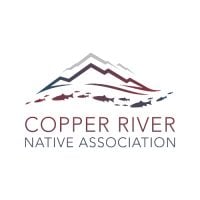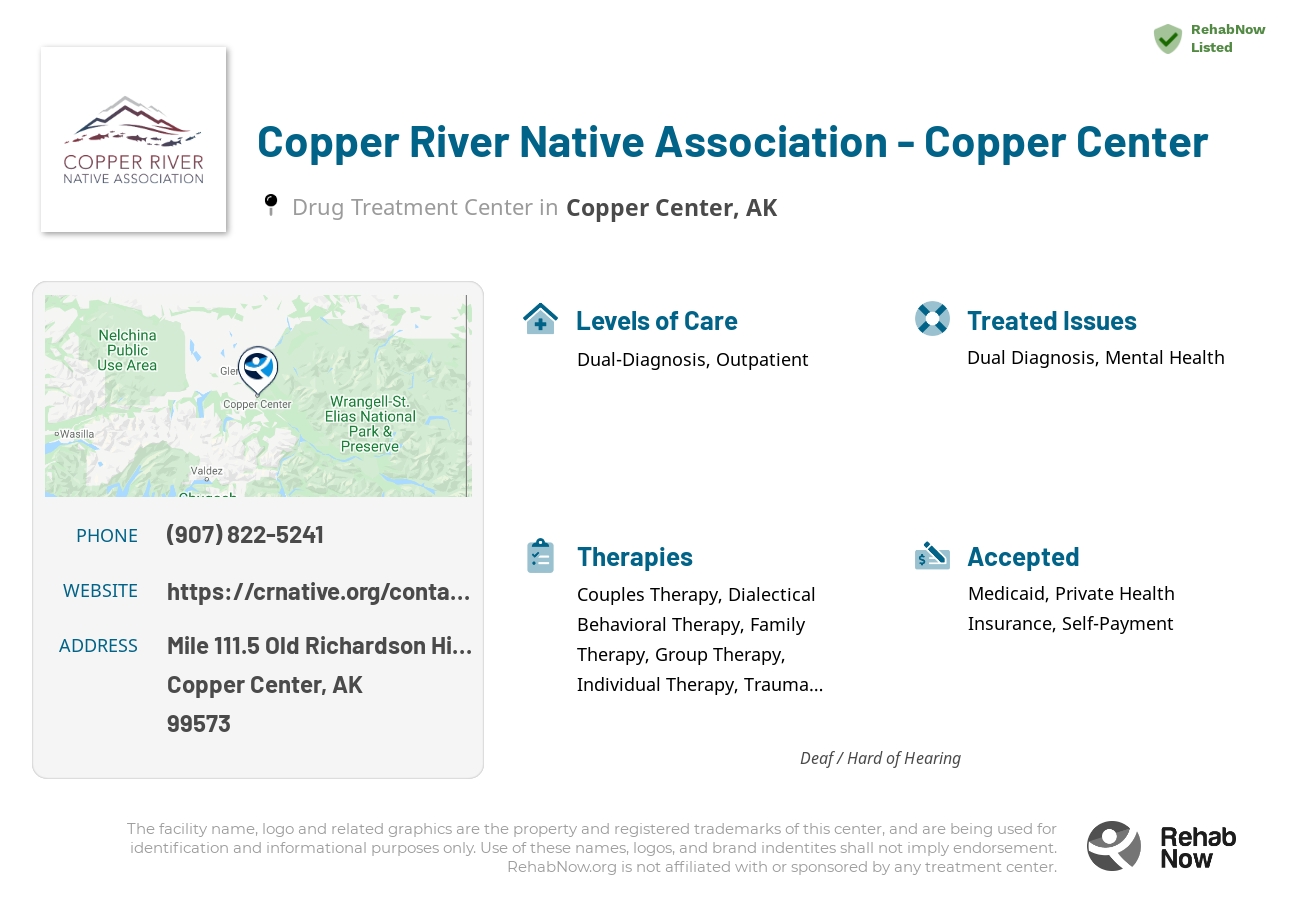Copper River Native Association - Copper Center
Drug Rehab Center in Copper Center, Alaska
The Copper River Native Association in Copper Center, Alaska offers a comprehensive approach to dual diagnosis and addiction treatment, providing evidence-based practices and culturally informed interventions such as individual and group counseling, medication management, and holistic approaches.
About
The Copper River Native Association - Copper Center in Copper Center, Alaska offers a comprehensive approach to those suffering from dual diagnosis, mental health, drug addiction, substance abuse, and alcoholism. They provide Dual-Diagnosis care as well as various outpatient levels of care, utilizing evidence-based practices and culturally informed interventions. Copper River Native Association - Copper Center is licensed by the State of Alaska and is accredited by the Joint Commission on Accreditation of Healthcare Organizations.
At Copper River Native Association - Copper Center, individuals have access to personalized treatment plans consisting of individual and group counseling, medication management, medical services, cognitive-behavioral therapies, and holistic approaches. They also provide family counseling, trauma services, and support groups to address the holistic needs of those in recovery. Additionally, the facility accepts private health insurance and is part of the Copper River Native Association.
Genders
Ages
Modality
Additional
Conditions and Issues Treated
A person who struggles with addiction and a mental health condition suffers from a dual diagnosis. This means that they have two issues that must be treated. The specific mental health issues that the patient at Copper River Native Association - Copper Center might have include but are not limited to:
- Depression
- Bipolar Disorder
- Anxiety
- PTSD (Post Traumatic Stress Disorder)
The specific addiction issues that the patient might have include but are not limited to:
- Alcoholism
- Drug Addiction (i.e., Cocaine, Meth, and other stimulants, Marijuana, and Ecstasy)
The combination of the two illnesses can be tough to treat. Taking care of one or the other is tough, and taking care of both cannot be done alone. A patient who receives dual diagnosis treatment will be given the best chance at becoming sober.
Levels of Care Offered
This center offers a variety of custom treatment tailored to individual recovery. Currently available are Dual-Diagnosis, Outpatient, with additional therapies available as listed below.
An outpatient treatment program is set up to help with alcohol or drug addiction or a co-occurring disorder. The treatment must attend the treatment facility for their therapy and other programs but return home each night. The frequency of mandatory attendance decreases after much of the treatment program is complete. The treatment programs are monitored by the treatment facility and case managers who work for a judge or judge’s office. A treatment program may be performed out of a treatment facility, treatment clinic, or treatment center.
The benefits of outpatient treatment programs are many. One of the most beneficial treatment programs is that it allows treatment for clients who cannot afford or may not be able to attend treatment at a treatment facility, treatment center, or treatment clinic full-time. Another benefit of treatment programs is that they reduce crime rates because treatment allows people to treat their addiction.
Therapies & Programs
Individualized Treatment is essential because it gives addicts the ability to participate in a program that meets their unique needs. An addict should work with professionals who understand what they’re going through, especially if the addict is actively using. Finding the right treatment program for an addict is difficult, but it’s even harder without communicating with those who have experience treating your specific situation.
Couples therapy is a treatment approach where the patients and their partners are engaged together. When a person becomes a victim of substance abuse, it affects the patient and his people, particularly his partner. Their relationship can become strained due to lack of communication, financial issues, loss of trust, lack of intimacy, and physical abuse in more severe cases. Couples therapy addresses these issues and tries to rebuild the trust between the partners. The partner’s involvement in the process will result in greater chances of treatment success and sustained recovery.
The therapies typically involve all family members, potentially including siblings, children, and parents who play a role in their daily lives. These sessions can be essential because they address past issues that may have affected an addict or alcoholic’s recovery process. They provide support during this time when it is needed most!
A family therapy session, often called a family meeting or intervention, is a necessary process that helps loved ones of addicts see their situation in a new light. It’s also one of the most challenging things families will ever have to do when they’re facing a loved one battling addiction or alcoholism.
Group therapy sessions provide recovering addicts with a chance to cope with everyday situations that many face. Group therapy sessions are held in rehab facilities, clinics, churches or community centers that offer drug addiction treatment.
People who attend these groups are encouraged to voice their feelings and support other addicts in recovery. This helps group members strengthen their own recovery program while cheering on others who are struggling with sobriety.
Trauma therapy allows them to work through past trauma to have peace of mind and begin down the road of sobriety. The therapist will work with the individual to help them understand their past and present relationships. Patients may often believe that something is inherently wrong with them or they are unworthy of love. The therapist aims to correct these negative feelings and behaviors by helping the person realize that their actions do not reflect who they truly are.
Dialectical behavior therapy, or DBT, is one form of cognitive behavioral treatment. This type of therapy typically involves both individual and group sessions with a therapist on a regular basis.
It uses concepts like mindfulness training to help addicts learn how to identify their thoughts, feelings, behaviors and the experiences that trigger them so they can avoid relapse. DBT also teaches addicts how to regulate their emotions, which can make it easier for them to avoid or overcome negative thoughts and cravings.
Cognitive Behavioral Therapy (CBT) is a highly effective treatment option based on the idea that how we feel, think and act all interact together. Our thoughts determine our feelings and behaviors; our feelings affect our thoughts, and our behaviors change our thoughts and feelings. CBT helps people explore their thoughts for problems (or false beliefs) that influence their mood and actions. By examining their thoughts and beliefs, people can recognize distorted or irrational and modify them to more realistic, positive ones. CBT is very goal-oriented, which means that the therapist and patient work together on a specific problem while learning to become more adept at solving future problems.
CBT works well with a broad range of people, including those with depression, anxiety disorders, eating disorders, and problems with anger. In addition to helping a client focus on thoughts that can be changed, CBT also allows them to take an active role in their treatment. This is called a collaborative approach because both patient and therapist work together to produce the best possible results.
CBT is based on cognitive learning theory, which says that our behavior is a learned response to our environment. Cognitive refers to thoughts and beliefs, while behavioral relates to actions or deeds. CBT helps people learn ways of behaving to improve their quality of life by focusing on specific problems or goals they want to achieve. Sometimes, CBT is used alone; other times, it is combined with medications or brief counseling techniques such as solution-focused and motivational interviewing to achieve optimal results for the patient.
Payment Options Accepted
For specific insurance or payment methods please contact us.
Is your insurance accepted?
Ask an expert, call (888) 674-0062
Copper River Native Association Associated Centers
Discover treatment facilities under the same provider.
Learn More About Copper River Native Association Centers
Additional Details
Specifics, location, and helpful extra information.
Copper Center, Alaska 99573 Phone Number(907) 822-5241 Meta DetailsUpdated November 25, 2023
Staff Verified
Patient Reviews
There are no reviews yet. Be the first one to write one.
Copper Center, Alaska Addiction Information
Alaska is enduring a multi-faceted drug and alcohol abuse problem. Heroin-related overdoses are 50% higher in Alaska than in the rest of the United States. Methamphetamine use is a major contributing factor to violent crime in Alaska. More than 60,000 Alaskans need some sort of treatment for substance abuse and/or addiction.
Substance abuse is also a major problem in Copper Center, Alaska. In 2014, around 16% of the adult population had abused drugs at some point. Drug-related deaths increased by 20%. It's important to be aware of the dangers of drug abuse and seek help if you or someone you know is struggling with addiction.
Treatment in Nearby Cities
- Homer, AK (264.6 mi.)
- Ketchikan, AK (668.6 mi.)
- Nome, AK (647.8 mi.)
- Dillingham, AK (490.5 mi.)
- Saint Paul Island, AK (930.5 mi.)
Centers near Copper River Native Association - Copper Center
The facility name, logo and brand are the property and registered trademarks of Copper River Native Association - Copper Center, and are being used for identification and informational purposes only. Use of these names, logos and brands shall not imply endorsement. RehabNow.org is not affiliated with or sponsored by Copper River Native Association - Copper Center.


